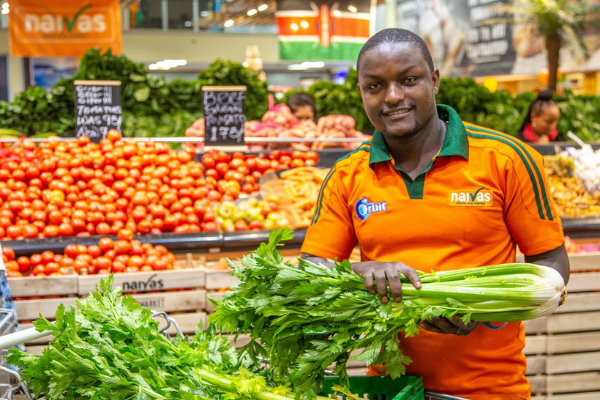Mike Oranga, Assistant Secretary General of the Kenya Union of Commercial, Food and Allied Workers (KUCFAW) says more retail workers are employed as “flex-timers” and may struggle to adapt to new technologies.
Until recently the Kenyan retail sector was dominated by two family-owned retail chains, Nakumatt and Tusky’s. Mismanagement, increased competition and bad decisions led to the downfall of Nakumatt, which closed all operations in 2017. This left a void in the market that other retailers have rushed to fill. The main players are Tusky’s and Naivas, making up approximately 46% of the market in Nairobi (Asoko Insight, 2020).
French supermarket chain Carrefour moved into Kenya in 2016 and dominates the high-end market. Shoprite entered the market in 2018 and has planned on expanding rapidly, focusing mainly on shopping malls in affluent neighbourhoods in Nairobi. However, Shoprite announced the closure of one Nairobi store due to COVID-19. Massmart currently has three stores in Kenya (under their brand Game). Over 80% of Kenyans are employed in the informal sector. Only around 0.6% of the 48 million Kenyans earn what can be considered “middle-class wages” (White & Rees, 2019).
The average formally employed Kenyan earns around USD 785 per month, and about half of Kenyan households earn less than 100 USD per month. One in three Kenyans lives “below the international poverty line of less than $1.90 per day” (White & Rees, 2019). Despite vast increases in urbanisation, only around 26% of the population lives in urban centres.
Despite these clear challenges, Tuskys is aggressively expanding, and Naivas in 2019 was the country’s biggest online retail supermarket. Experts venture that local retailers still account for more than 85% of supermarket sales (White & Rees, 2019). This does not bode well for international retailers trying to enter and expand into what is a relatively small middle-class market.
For our recent Future of Retail in Africa study, I spoke to Mike Oranga, Assistant Secretary General of the Kenya Union of Commercial, Food and Allied Workers (KUCFAW):
Do you see any changes in your day-to-day life working in retail that are due to new technologies?
Yes.
What are these technologies? Do they make retail work harder or easier? How are they affecting workers?
- Social media marketing: availing goods and services to e-commerce platforms.
- Fast customer service at retail stores, like automated Points of Sale/tills
- Innovation on Space: Having a food court in their spaces, leading to more customer flow.
- Easy and efficient record-keeping and market prediction: helps keep accurate and reliable data and also makes available enough merchandise.
- Online Shopping and Pick up: less physical contact with customers.
- Increased security: Security cameras, for example, discourages shoplifters from stealing.
- New modes of payment: cashless transactions.
What has changed about your job in the last 5 to 10 years?
There is a reduced workload due to new market players and competition.
How have you seen retail work change over the last 5 to 10 years?
- Employers are moving towards outsourcing and part-time work.
- There is reduced customer flow due to new market players and competition.
- The basket value has gone up.
What are you scared will change in the work environment?
Loss of employment due to new technologies.
Has staff scheduling affected retail workers in Kenya?
Yes – the introduction of shifts that stretch into the night and complete night shifts has affected family dynamics.
Has automation affected retail workers?
Yes.
Also read: Future of retail interviews with unions in South Africa and Zambia.
You may like: Future of Retail in Africa study – some potential trade union responses to the identified changes in the sector.







